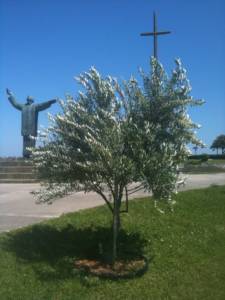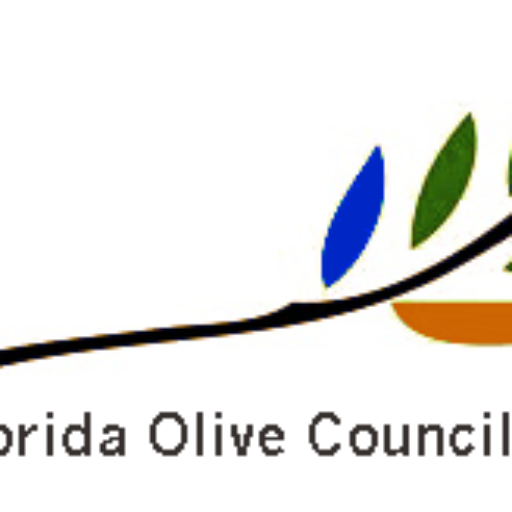
Blooming Olive Tree-St. Augustine, FL
The olive (Olea europaea L.) grows in Florida. In the photo, a healthy, blooming 4 year old olive tree overlooks the site of the Spanish landing in 1565 at St. Augustine. Many more olive trees thrive throughout Florida. Like much of the olive-friendly Mediterranean basin, Florida has sandy, well-drained soils, lots of sun and generally sufficient rainfall. There are reports of producing olive groves in the 1700s near Daytona Beach and a reported “35-foot bearing olive tree” was documented near Tampa in the 1920s. Today, there are roughly 300 acres of olive trees growing across Florida tended by several dozen amateur and professional growers.
While olive production in Florida is only starting, indications for a successful olive industry look promising. Don Mueller has 400 olive trees near Marianna, FL (Jackson County) and has been selling olives and making oil for more than 15 years. Several commercial high density olive groves (500 trees/acre) have been established in the last two years in Florida with more under development. Small farmers are also establishing groves and many backyard hobbyists are trying their hand at olive cultivation. Two new Florida olive mills have been established.
However, while olive trees grow in Florida, much about their long-term fruit production is unknown. Questions about the availability of sufficient cool weather, the effects of excessive rainfall during bloom periods, the impact of native pests and other issues are of concern.
To address these issues, in 2011 The Florida Olive Council (FOC) designed a state-wide research plan to measure the development of twenty (20) olive varieties and observe the efficacy of various planting schemes. Research plots were established and monitored at over 20 public and private locations in the State. The work continues.
In partnership with the University of Florida’s Institute of Food and Agricultural Sciences (UF-IFAS) and the State’s agricultural industry, the Council is helping direct and fund necessary research fundamental to answering key questions about the commercial viability of olive cultivation in Florida.
We welcome your comments and solicit your tax-deductible support.


Add Your Comment